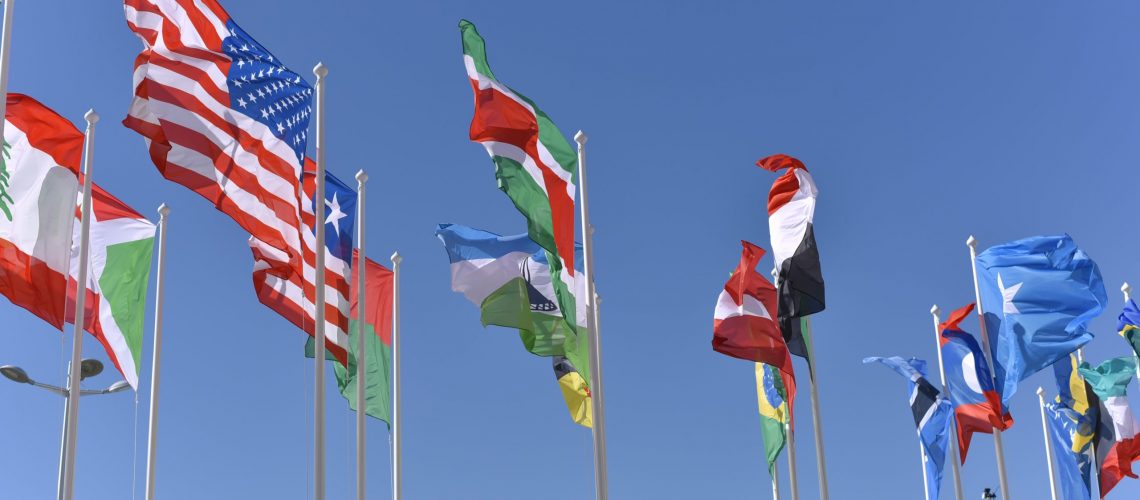
An event organizer is well-versed with juggling a wide range of roles simultaneously- from project manager to quality inspector. But add in the international dynamic- visa requirements, language barriers, and cultural differences, to name a few- and the role takes on a whole new level of complexity.
But like all challenging endeavors, with the right amount of planning, preparation, and education, running an event in a different country can be a thrilling, rewarding experience.
Whether it’s the first event, or one of many, here is a compilation of the best strategies for making the next international event an exciting, unforgettable success.
Related: The Ultimate Guide for Marketing Your Virtual Event
How to Produce a Successful Event
To produce a successful event abroad, organizers need to do more than think outside the box, they need to go beyond borders. Luckily, they don’t need to blaze the trail or go the distance alone.
Here are the top strategies to make any event an international success.
Learn how we can help you by checking out what we did for the Boston Beer Company.
Be Culturally Sensitive
It’s pivotal that event organizers learn the cultural norms of the host country and attendees to ensure they don’t disrespect those with whom they are trying to build relationships. A quick google search will reveal common cultural faux pas and how to avoid them.
All event materials should be translated in the host country’s native language, and. And at the very least, event planners should learn how to greet and thank guests in the same language.
Become Familiar with the Destination
Upon arrival, the best way organizers can support guests is to map out the environment through the eyes of the event participants. Find out the best way to access the venue, providing public transportation options and detailed directions via car, bike, and pedestrian paths.
Include recommendations for places to explore or dine, as well as high-traffic or high-risk areas that guests might want to avoid.
Find a Professional Local Partner
It’s always good for event planners to have connections, especially when navigating uncharted territory from a substantial distance. Expert, trustworthy local partners provide event organizers boots on the ground throughout the planning process to ensure an exceptional experience for all.
If starting from scratch, event planners can reference CVB sites (Convention and Visitors Bureaus), such as Cvent Supplier Network, to locate a list of available venues and vendors in the area.
CVBs, also known as DMOs (Destination Marketing Organizations), are reliable resources that can do a lot of the heavy lifting abroad, such as sourcing, leveraging locally resources, and navigating cultural or language barriers.
Global production companies can also provide an all-in-one solutionall of your necessities within one organization; from venue and language support to keynote speaker, food selection, content production, venue layout down to event broadcasting.
Check Out Local Event Planning Services

Compile a list of local companies that can provide catering, audiovisual, equipment rental, technical and translation services, etc, preferably from recommended sources.
After selecting the best service providers for the event, it’s important to schedule a face-to-face meeting at the venue to make sure to confirm everyone is on the same page and all the event needs are covered.
Know Your Attendees
Like any event, local or foreign, it’s crucial to know the audience’s needs and expectations. Organizers need to put themselves into the minds and in the shoes of their guests and consider what would make their experience exceptional, as well as what challenges or inconveniences they might experience and how to alleviate them.
Personalize Your Event Invitations
Again, in keeping with cultural norms, it’s important to make recipients feel respected and valued, and a generic email blast might be received as cold and dismissive in some cultures. Thankfully, there are several software options that make managing and customizing your email lists and invitations quick and easy.
Related: How To Produce the Perfect Hybrid Event: This Requires Professional Help
Communicate Regularly with Attendees
Communication is key to establishing rapport and trust with attendees. Sending reminders, updates, and any information regarding event changes, travel, etc. Establish a reliable contact for participants to rely on for help with any issues or questions.
It’s also nice to send a travel checklist and list of things to do in the surrounding area before or after the event.
Plan the Agenda Accordingly
Every culture has their own view on time and the importance of punctuality. For example, (and generally speaking, of course) Asian cultures tend to arrive on time, if not early, while Mediterranean countries tend to view schedules more as suggestions. To ensure both presenters and attendees get the most out of the event, event planners should factor for cultural norms and adapt the agenda accordingly.
Arrange Transportation and Housing
Transportation is often the most stressful part of attending international events, so organizers need to support participants with arrangements as much as possible. Ideally, event websites will have a page dedicated to providing detailed information and resources to guide attendees, along with maps, directions, and recommendations.
And discounts are well-received if not expected from those traveling from afar!
Meet Face to Face (Familiarization Trip)

For international events, a good amount of planning will have to take place virtually or over the phone. But to avoid unexpected surprises on event day, it’s imperative to meet with as many suppliers and partners as possible prior to the event, preferably on-site.
Face-to-face meetings inevitably cultivate rapport and lead to tips and referrals that will save planners time, money, and potential headaches.
Come prepared with a list of things to cover and all related questions and make sure to review and confirm all contract details so there are no misunderstandings or unexpected costs or stipulations.
Expand Your Ticketing Payment Processors
Most international events involve the challenge of juggling currencies and might mean accepting alternative methods of payments, including some of the major cryptocurrencies. To avoid losing potential attendees, it is the event hosts’ responsibility to have the ticketing software and payment methods in place to accommodate international attendees.
Pitfalls to Avoid
Dealing with the social, cultural and legal differences that come with planning an international event can be overwhelming for even the most seasoned event organizers. To make the experience both successful and enjoyable for event participants, as well as those running the show, here are some common pitfalls to avoid.
Unintentionally Disrespecting the Local Culture
This is all too common and easily avoided when given the proper attention. Do an online search and ask your local partners for major cultural differences that prevail in the host country, and take notes! Are there religious considerations, gastronomical particularities, or social tensions that need to be considered? What customs or rituals need to be respected with regards to gender and age, negotiations, etc.?
Not Enough of a Support System
We can’t emphasize this enough: event planners are only as good as the local partners they surround themselves with. It’s almost impossible to run a successful event in a different country without the help of a reliable local team to help guide planning processes, avoid cultural mishaps, and source local gems reserved for those savvy enough to ask for help.
Lack of Clear Communication
Language barriers are a common challenge that can quickly turn a seemingly straightforward situation into an awkward and complicated mess. Even when hosts have a good grasp on the language, regional accents and expressions can often complicate things further.
Make sure there is a designated translator or a team of people fluent in the local language to avoid unnecessary confusion.
Misunderstanding Exchange Rates

It’s important for event planners to learn what the exchange rates are, along with national, regional and local taxes. Additionally, visiting hosts need to educate themselves on cultural norms around negotiating prices, paying the bill, etc. to avoid over or underpaying, or worse, offending business associates, event attendees, and partner organizations.
Related: Human Connection: Why Hybrid Events Produce Mind-Blowing Results
Final Thoughts on Overseas Events
Running an event in a foreign country is not for the faint of heart. Overcoming the challenges of language barriers and unfamiliar and sometimes frustrating customs can be daunting. But with the right strategy, local guidance, and mindset in place, the experience can also be rewarding and exhilarating for organizers and attendees alike.
If you need a partner who has experience in virtual and hybrid events, reach out to us and we will help you get started.


